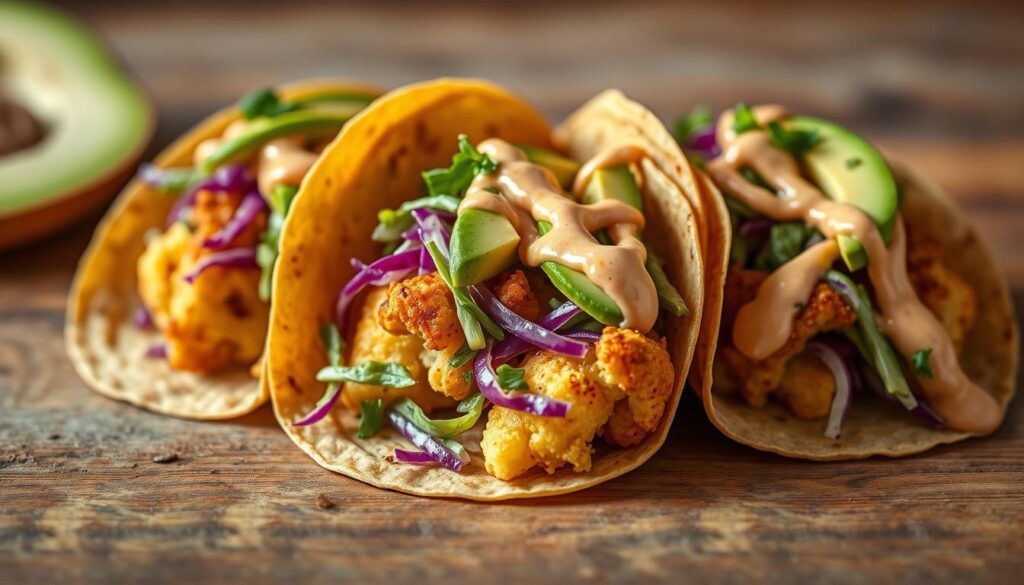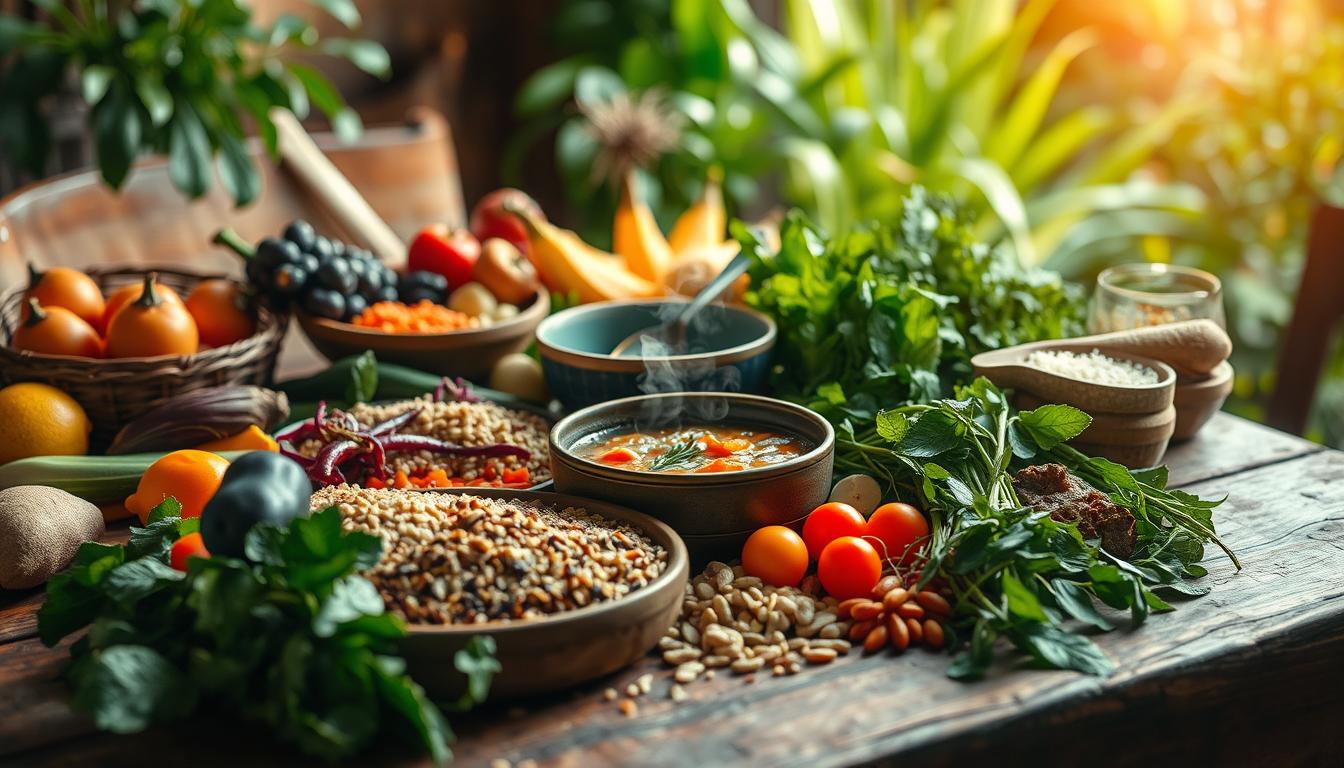Embracing sustainable eating habits is a crucial step towards a healthier planet. One effective way to achieve this is by incorporating plant-based nutrition into your daily meals. By choosing eco-friendly diets, we not only improve our health but also contribute to global food security.
Simple changes in our eating habits can have a significant impact. For instance, opting for plant-based recipes reduces the demand for resource-intensive animal products, thereby supporting a more sustainable food system.
Key Takeaways
- Adopting plant-based meals supports sustainable eating.
- Eco-friendly diets contribute to global food security.
- Simple recipe changes can make a significant impact.
- Plant-based nutrition is beneficial for personal health.
- Sustainable eating habits are crucial for a healthier planet.
The Connection Between Plant-Based Nutrition and Sustainability
The link between plant-based nutrition and sustainability is becoming increasingly evident as we explore the environmental impact of our food choices.
Environmental Impact of Food Choices
Our dietary preferences have a significant impact on the environment, with animal agriculture being a substantial contributor to greenhouse gas emissions and water pollution.
Reducing Carbon Footprint
By choosing plant-based options, individuals can significantly reduce their carbon footprint. Some key benefits include:
- Lower greenhouse gas emissions
- Reduced water usage
- Less land degradation
Water Conservation
Plant-based diets tend to require less water compared to meat-based diets, making them a more water-efficient choice. This is particularly important in regions where water scarcity is a concern.
Health Benefits of Plant-Based Eating
In addition to its environmental benefits, a plant-based diet offers numerous health advantages, including improved nutrient density and disease prevention.
Nutrient Density
Plant-based diets are rich in essential nutrients, including vitamins, minerals, and antioxidants. These nutrients support overall health and well-being.
Disease Prevention
A well-planned plant-based diet can help prevent chronic diseases, such as heart disease, diabetes, and certain types of cancer. By incorporating a variety of whole, plant-based foods, individuals can support their overall health.
Hearty Lentil and Vegetable Soup
Savor the flavors of our Hearty Lentil and Vegetable Soup, a nutrient-dense meal that’s both sustainable and satisfying. This recipe is a great example of how plant-based eating can be both healthy and environmentally friendly.
Ingredients
Our Hearty Lentil and Vegetable Soup includes a variety of vegan protein sources and nutrient-dense plant foods. The ingredients are:
- 1 cup dried green or brown lentils, rinsed and drained
- 2 cups water or vegetable broth
- 1 onion, chopped
- 2 cloves garlic, minced
- 2 carrots, chopped
- 2 celery stalks, chopped
- 1 can diced tomatoes
- 1 teaspoon dried thyme
- Salt and pepper, to taste
Preparation Instructions
Preparing this hearty soup is straightforward. Here’s how to do it:
Prep Time: 15 minutes
Cook Time: 30 minutes
- In a large pot, sauté the onion, garlic, carrots, and celery in a little water until tender.
- Add the lentils, broth, diced tomatoes, and thyme. Season with salt and pepper.
- Bring to a boil, then reduce the heat and simmer until the lentils are tender.
Sustainability Benefits
This Hearty Lentil and Vegetable Soup is not only delicious but also packed with sustainability benefits. By using protein-rich legumes as meat alternatives, we reduce our environmental footprint.
Protein-Rich Legumes as Meat Alternatives
Lentils are a great source of protein, making them an excellent alternative to meat. This reduces the demand for resource-intensive livestock farming.
Seasonal Vegetable Usage
Using seasonal vegetables reduces food waste and supports local farming. This approach to cooking is both sustainable and cost-effective.
| Benefits | Environmental Impact | Health Benefits |
|---|---|---|
| Protein-Rich Legumes | Reduces livestock farming demand | High in protein and fiber |
| Seasonal Vegetables | Reduces food waste | Rich in vitamins and minerals |
Chickpea and Sweet Potato Buddha Bowl
Delight in the flavors and benefits of a Chickpea and Sweet Potato Buddha Bowl, a dish that supports ethical food production and contributes to a more sustainable food system.
Ingredients
- 1 medium sweet potato, peeled and cubed
- 1 can chickpeas, drained and rinsed
- 2 tablespoons olive oil
- 1 teaspoon cumin
- Salt and pepper to taste
- Fresh kale, chopped
Preparation Instructions
To prepare this nourishing bowl, start by roasting the sweet potato in the oven until tender.
Prep Time: 20 minutes
Cook Time: 25 minutes
Simply toss the sweet potato cubes with olive oil, cumin, salt, and pepper, and roast at 400°F (200°C) for 25 minutes. Meanwhile, sauté the chickpeas with a bit of olive oil and season with salt and pepper.
Sustainability Benefits
This Chickpea and Sweet Potato Buddha Bowl promotes food system sustainability through its ingredients.
Water-Efficient Crop Choices
Sweet potatoes and chickpeas are water-efficient crops, requiring less water compared to other protein sources.
Complete Protein Combinations
Paired with kale, this bowl provides a complete protein, supporting a balanced diet while minimizing environmental impact.
Zero-Waste Vegetable Stir-Fry
Join us in celebrating global food security with a zero-waste vegetable stir-fry that’s as nutritious as it is sustainable. This recipe is a perfect example of how zero-waste cooking can be both delicious and environmentally friendly.
Ingredients
The beauty of this stir-fry lies in its flexibility. Use a variety of vegetable scraps such as carrot tops, celery leaves, and broccoli stalks. Other ingredients include 2 tablespoons of olive oil, 1 onion (chopped), 2 cloves of garlic (minced), and your choice of protein (tofu or tempeh work well).
Preparation Instructions
Preparing this stir-fry is quick and easy. Start by heating the olive oil in a large pan over medium heat. Add the chopped onion and cook until translucent, then add the minced garlic and cook for another minute.
Prep Time: 15 minutes
Cook Time: 10 minutes
Add your vegetable scraps and chosen protein to the pan, stirring well to combine. Cook until the vegetables are tender, then season with your favorite spices and serve.
Sustainability Benefits
This zero-waste vegetable stir-fry is not only a tasty way to reduce food waste but also contributes to global food security by making the most of the ingredients you have on hand.
Using Vegetable Scraps
By utilizing vegetable scraps, we reduce the amount of waste sent to landfills, which in turn reduces methane production, a potent greenhouse gas.
Reducing Food Waste
Reducing food waste is a critical step towards achieving global food security. By making the most of our ingredients, we can help ensure that more people have access to nutritious food.
Seasonal Fruit and Nut Breakfast Oats
Incorporating seasonal fruits and nuts into your breakfast oats is a delicious way to boost your plant-based nutrition and support sustainable eating habits. This simple breakfast recipe not only nourishes your body but also contributes to a healthier planet.
Nourishing Ingredients
To make this delightful breakfast, you’ll need the following ingredients:
- 1/2 cup rolled oats
- 1 cup seasonal fruit (such as berries or sliced apples)
- 1/4 cup chopped nuts (like almonds or walnuts)
- 1 tablespoon chia seeds
- 1 cup plant-based milk
Easy Preparation Instructions
Preparing your seasonal fruit and nut breakfast oats is straightforward:
- Combine oats, chia seeds, and plant-based milk in a jar. Refrigerate overnight.
- In the morning, top with seasonal fruit and chopped nuts.
Prep Time: 10 minutes (plus overnight soaking)
Cook Time: 0 minutes
Sustainability Benefits
This breakfast recipe supports sustainable eating through low-energy preparation and seasonal eating practices.
| Sustainability Aspect | Benefit |
|---|---|
| Low-Energy Preparation | No cooking required, reducing energy consumption. |
| Seasonal Eating Practices | Using seasonal fruits minimizes the carbon footprint associated with transportation and storage. |
By choosing seasonal fruits and nuts, you’re not only enjoying a nutritious breakfast but also promoting environmentally friendly food choices. This recipe is a perfect example of how plant-based nutrition and sustainable eating habits can go hand in hand.
Plant-Based Nutrition Powerhouse: Black Bean Burgers
Sustainable eating just got a whole lot tastier with the introduction of black bean burgers, a powerhouse of plant-based nutrition. These burgers are not only delicious but also offer numerous health and environmental benefits, making them an excellent choice for those embracing eco-friendly diets.
Ingredients
To make these nutritious burgers, you will need the following ingredients: black beans, onions, garlic, bell peppers, oats, and a blend of spices. These ingredients come together to create a patty that is not only flavorful but also rich in vegan protein sources. The use of black beans as the primary ingredient ensures that the burgers are high in protein and fiber, making them a nutritious alternative to traditional meat burgers.

Preparation Instructions
Preparing black bean burgers is straightforward and quick. Start by blending the ingredients together, then shape them into patties. The preparation is simple, with a
Prep Time: 20 minutes
and
Cook Time: 15 minutes
, making it an ideal meal for a busy day.
To cook, simply pan-fry the patties until they are golden brown on both sides. Serve on a whole-grain bun with your favorite toppings, and you have a meal that is both satisfying and sustainable.
Sustainability Benefits
Black bean burgers offer several sustainability benefits. One of the key advantages is their role as land-efficient protein sources. Unlike traditional livestock farming, which requires large tracts of land, black beans can be grown on relatively small plots, making them a more sustainable option.
Additionally, choosing black bean burgers contributes to reduced greenhouse gas emissions. The production of black beans generates significantly less greenhouse gases compared to the production of meat, making this a more environmentally friendly choice for those looking to reduce their carbon footprint.
Locally-Sourced Roasted Vegetable Pasta
Savor the taste of sustainability with our locally-sourced roasted vegetable pasta, a recipe that highlights the importance of climate-conscious food choices. By choosing locally-sourced ingredients, we not only reduce our carbon footprint but also support the local economy and enjoy nutrient-dense plant foods at their best.
Ingredients
- 8 oz pasta of your choice
- 2 cups mixed locally-sourced vegetables (such as zucchini, bell peppers, cherry tomatoes)
- 2 tbsp olive oil
- 1 tsp dried basil
- 1 tsp dried oregano
- Salt and pepper to taste
- Grated Parmesan cheese (optional)
Preparation Instructions
Preheat your oven to 400°F (200°C). Toss the mixed vegetables with olive oil, basil, oregano, salt, and pepper on a baking sheet. Roast in the oven for 20-25 minutes or until tender.
Prep Time: 15 minutes
Cook Time: 30 minutes
Cook the pasta according to package instructions until al dente. Combine the roasted vegetables with the cooked pasta. Top with grated Parmesan cheese if desired.
Sustainability Benefits
This recipe is not only delicious but also embodies the principles of sustainable eating. By choosing locally-sourced produce, we significantly reduce the environmental impact associated with transporting food over long distances.
Reducing Food Miles
Locally-sourced ingredients mean fewer food miles, contributing to lower greenhouse gas emissions.
Supporting Local Farmers
By purchasing from local farmers, we support the local economy and promote agricultural biodiversity.
Climate-Friendly Cauliflower Tacos
Embracing sustainable eating can be as simple as making cauliflower tacos, a dish that’s both healthy and environmentally conscious. This recipe not only delights the palate but also supports ethical food production by choosing ingredients that are gentle on the planet.
Ingredients
The beauty of cauliflower tacos lies in their simplicity. You’ll need:
- 1 head of cauliflower
- 1 tablespoon olive oil
- 1 teaspoon cumin
- 1 teaspoon chili powder
- Salt and pepper to taste
- 8 taco-sized tortillas
- Your choice of toppings (e.g., avocado, salsa, cilantro)
Preparation Instructions
To prepare your climate-friendly cauliflower tacos, start by preheating your oven to 425°F (220°C). Toss cauliflower florets with olive oil, cumin, chili powder, salt, and pepper. Spread on a baking sheet and roast for 20-25 minutes, or until tender.
Prep Time: 20 minutes
Cook Time: 25 minutes

Sustainability Benefits
Cauliflower is a low-impact crop, requiring less water and pesticides compared to many other vegetables. By choosing plant-based alternatives like cauliflower, we’re supporting zero-waste cooking and reducing our environmental footprint.
Low-Impact Crop Choices
Cauliflower and other low-impact crops are crucial for sustainable agriculture. They help maintain soil health and reduce the need for chemical inputs.
Plant-Based Alternatives to Meat
By opting for cauliflower tacos, you’re not only enjoying a delicious meal but also contributing to a more sustainable food system. This choice supports ethical food production and reduces the demand for resource-intensive meat products.
Nutrient-Dense Quinoa and Kale Salad
Embracing nutrient-dense foods like quinoa and kale is crucial for sustainable eating. This quinoa and kale salad is not only a delicious meal option but also supports food system sustainability and global food security.
Ingredients
- 1 cup quinoa, rinsed and drained
- 2 cups water or vegetable broth
- 2 cups kale, stems removed and discarded, leaves chopped
- 1/2 cup cherry tomatoes, halved
- 1/4 cup olive oil
- 2 tablespoons lemon juice
- Salt and pepper to taste
Preparation Instructions
To prepare this salad, start by cooking the quinoa in water or broth until tender. Meanwhile, massage the chopped kale with olive oil until tender. Combine cooked quinoa, kale, and cherry tomatoes in a bowl. Drizzle with lemon juice and season with salt and pepper.
Prep Time: 15 minutes
Cook Time: 15 minutes
Sustainability Benefits
This salad promotes sustainability through the use of drought-resistant crops like quinoa. Quinoa requires less water compared to other grains, making it an excellent choice for water-conscious farming. Additionally, kale is rich in nutrients, enhancing nutritional efficiency.
Drought-Resistant Crop Selection
Quinoa’s ability to thrive in challenging environmental conditions supports farmers in regions with limited water resources.
Nutritional Efficiency
Kale’s high nutritional value means that less food is needed to meet dietary requirements, supporting global food security.
Eco-Conscious Mushroom and Walnut Bolognese
Embracing plant-based nutrition, our eco-conscious mushroom and walnut Bolognese recipe offers a sustainable twist on a classic Italian dish. This hearty, flavorful meal is not only delicious but also aligns with eco-friendly diets, making it a great choice for those looking to reduce their environmental footprint.
Ingredients
The ingredients for our eco-conscious mushroom and walnut Bolognese include:
- 1 cup mushrooms, sliced
- 1/2 cup walnuts, chopped
- 1 onion, finely chopped
- 2 cloves garlic, minced
- 1 can (28 oz) crushed tomatoes
- 1 tsp dried basil
- 1 tsp dried oregano
- Salt and pepper, to taste
- 1 tbsp olive oil
Preparation Instructions
To prepare this sustainable Bolognese, follow these steps:
- Heat the olive oil in a large pan over medium heat.
- Add the chopped onion and cook until translucent.
- Add the garlic and cook for another minute.
- Add the mushrooms and cook until they release their moisture and start to brown.
- Add the chopped walnuts and cook for 2-3 minutes.
- Stir in the crushed tomatoes, basil, oregano, salt, and pepper. Bring to a simmer.
- Reduce heat to low and let sauce simmer for 20-30 minutes, stirring occasionally.
Prep Time: 20 minutes
Cook Time: 30 minutes
Sustainability Benefits
This eco-conscious mushroom and walnut Bolognese offers several sustainability benefits:
Forest-Friendly Ingredients
By using mushrooms and walnuts, we are promoting forest-friendly ingredients that have a lower environmental impact compared to resource-intensive livestock farming.
Meat Texture Alternatives
The mushrooms provide a meaty texture, making this Bolognese a satisfying alternative to traditional meat-based sauces, thus supporting eco-friendly diets.
As eco-friendly diets continue to gain popularity, recipes like our mushroom and walnut Bolognese are leading the way in sustainable eating. By choosing plant-based nutrition, we not only benefit our health but also contribute to a more sustainable food system.
“The way we eat is going to change dramatically in the next 20 years. The way we produce food, the way we distribute it, the way we consume it – everything is going to change.”
Conclusion: Embracing Sustainable Eating Through Plant-Based Recipes
As we’ve explored throughout this article, adopting sustainable eating habits is crucial for a healthier planet. By incorporating climate-conscious food choices into our daily lives, we can significantly reduce our environmental footprint.
The plant-based recipes shared here not only promote healthy eating but also support eco-friendly cooking practices. From hearty lentil soups to nutrient-dense quinoa salads, these dishes showcase the diversity and richness of plant-based cuisine.
By choosing locally-sourced ingredients, reducing food waste, and opting for seasonal produce, we can make a positive impact on the environment. Embracing sustainable eating habits is a journey, and every small step counts.
As you explore these plant-based recipes, we encourage you to experiment with new flavors and ingredients, and to make conscious choices about the food you eat. Together, we can create a more sustainable food culture that benefits both our health and the planet.




